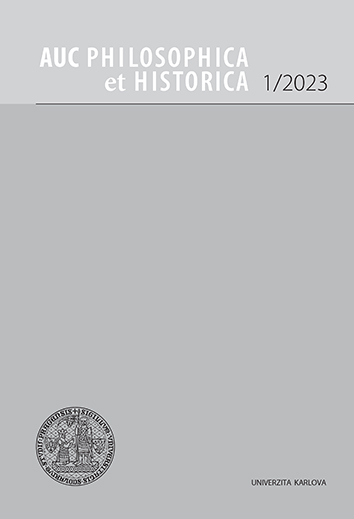AUC Philosophica et Historica je víceoborový akademický časopis zaměřený na humanitní a společenskovědné obory (filozofie, psychologie, pedagogika, sociologie, obecné, české a hospodářské dějiny, pomocné vědy historické a archivnictví, etnologie).
Časopis je indexován v databázích CEEOL, DOAJ a EBSCO.
AUC PHILOSOPHICA ET HISTORICA, Vol 2013 No 1 (2013), 15–35
Patočkovo pojetí životního smyslu v literatuře a v mýtu
[Patočka’s Conception of the Meaning of Life in Literature and Myth]
Miloš Ševčík
zveřejněno: 11. 01. 2015
Abstract
Patočka’s Conception of the Meaning of Life in Literature and Myth In this article, the author considers Jan Patočka’s discussions of the relation between literature and myth, the difference and the relationship between the truth of myth and the meaning of life in literature. At first, he presents Patočka’s concept of the dialectical relation between language and reality. In this context, he describes Patočka’s concept of mythical truth and its impact on ancient literature, which is both linked to myth and expresses it. Furthermore, he examines the difference between ancient and medieval literature and modern literature, and suggests that the transformation to literature in the modern sense of the word is identical with the abandonment of the expression of collectively shared meaning and the acceptance of the individual’s search for meaning. The question of the difference between the relation to myth in ancient and in medieval literature and in modern literature is answered by means of Patočka’s considerations on the ‘general’ in literature and the relation of literature to the ‘essential’, that is, to the revelation of beings in a whole. In this context, the author emphasizes the impact that Heidegger’s concept of the work of art had on Patočka’s considerations on the work of literature. Furthermore, the author seeks to demonstrate the character of the relationship between literature and myth by virtue of Patočka’s concept of three ‘movements of life’. It is in literature, that the movement of truth, that is, the search for the individual meaning of life, is realized. The author suggests that Patočka emphasized that the movement of truth suppresses the movements of acceptance and self-prolonging. In myth, by contrast, the dimensions of the movements of acceptance and self-prolonging come to the fore and the movement of truth is concealed by the ‘ontological metaphor’. Patočka argues that the truth of myth does not result from the explicit relation to beings in a whole, but it establishes itself even in modern literature; in some works of modern literature, the dimensions of the movements of acceptance and self-prolongation are accentuated and put into the expression of the overall and individual meanings of life.
vychází: 2 x ročně
ISSN: 0567-8293
E-ISSN: 2464-7055
